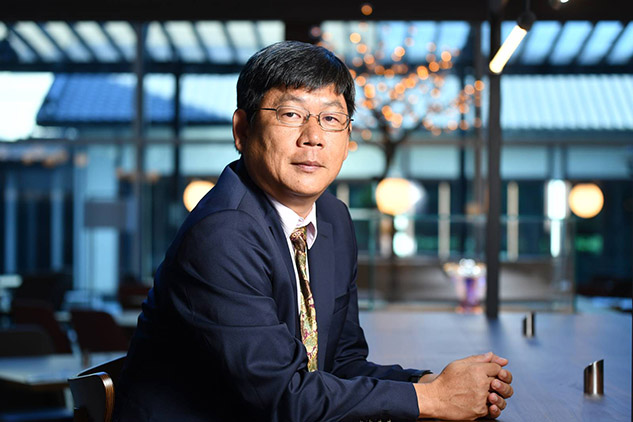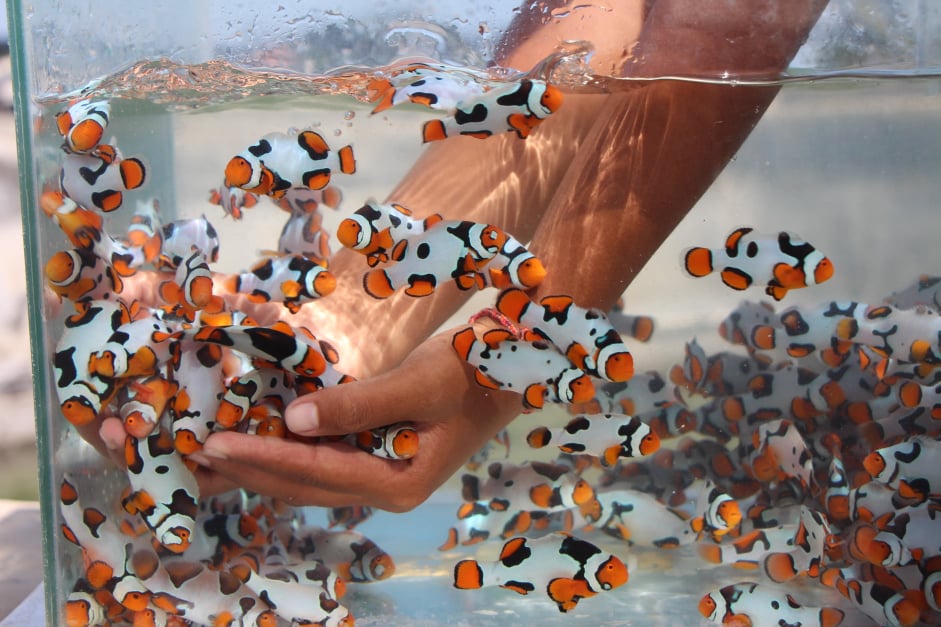Rescued by the Virus! Lobsters and Abalones Being Returned to Sea, Says ‘Clownfish King’

Source:Kuo-Tai Liu
The unique natural habitat of Bali gave rise to the “Clownfish King of the World”, Bali Aquarich founder Wen-Ping Su (蘇文炳). From his base in Bali, Su has the capability to quickly supply clownfish to any location in the world. During the ongoing COVID-19 pandemic, Su offers his first-hand account of how the virus is impacting the global market.
Views
Rescued by the Virus! Lobsters and Abalones Being Returned to Sea, Says ‘Clownfish King’
By Kuo-chen Luweb only
When he was 26, Taiwanese businessman Wen-ping Su was given the prestigious Shennong Award (神農獎) by then-President Lee Teng-hui. He tried to make his fortune in Indonesia, but when he was 32, the anti-Chinese riots that swept through the country took away all he had built. He spent the next ten years rebuilding his business, only to see his sale orders vanish during the 2008 financial crisis. In the end, he reversed his fortune with a few Styrofoam boxes of clownfish. He changed the world’s clownfish market with an empire that sells almost forty thousand aquafarm-produced clownfish every month. This is more than the amount netted by fishers around the world. He built sales channels in more than forty countries, which gave him the power to determine the global price of clownfish.
As the ongoing COVID-19 pandemic impacts the world economy almost as hard as the 2008 financial crisis did, and as China’s lockdown of the city of Wuhan enters its second month, Su shares his insightful observations with CommonWealth Magazine:
After the outbreak of COVID-19 and the lockdown of Wuhan, many asked me what the impact would be. My answer was, “Everything is gone.” The situation in the Chinese market is this: no flights, no market, no stores are open, no home delivery or freight delivery, and no living creature can enter or exit the cities.
The world’s live seafood trade is generally showing the same symptoms.
The local price of live lobsters in Vietnam fell by more than sixty percent. High-end seven-kilogram Norwegian salmon, which used to sell to the Chinese market in bulk, now needs new markets. I even heard that the prices are so low that fisherfolk in Australia felt bad about selling such precious ocean resources so cheaply, so they threw expensive lobsters and abalones back into the sea.
Customers placed orders in March, but freight costs raised tenfold
Things got better in March. Customers in Guangzhou, Shanghai, Shenzhen, and Hong Kong began placing orders. But freight costs increased by many magnitudes. Shipping to China went from costing US$1 per kilogram to more than US$10, a more than tenfold increase. But the price hike is not the biggest problem. The major headache is how difficult it is to book freight space.
I’ve been waiting for freight space for a week, but I still cannot get my deliveries to China. Airlines have told me that it still won’t be my turn next week, since they are prioritizing the delivery of electronic components.
In the face of the COVID-19 crisis, the most important thing is to hold onto good customers and ensure mutual survival and success with them. Buyers usually cover freight costs, but I will throw in some extra fish to make up for it. In the market’s current state, it’s very difficult to raise prices to reflect actual shipping costs.
Good customers are hard to find, so he sent an immediate shipment of respiratory masks to Korean customers
Aquariums are like paintings and antiques: They are kept around the house for leisure purposes. Because of this, such items are usually bought in times of peace and plenty. In less fortunate times, purchases of luxury items will decrease, and so it is with high-priced pet fish.
 Source: Wen-Ping Su
Source: Wen-Ping Su
Therefore, I am mentally prepared for a bad year. The important thing is to not lose valuable customers. So, as soon as I heard there was an outbreak in Korea, we sent a package of respiratory masks to our Korean clients by air.
I am setting up a global network. I will not put all my eggs in the basket of the Chinese market. China makes up twenty-five to thirty percent of the global aquarium fish market. It also contributes eight to ten percent of our sales. I know they like to fill you up with a deluge of orders, then starve you by withholding orders. Therefore, short-term fluctuations in a single country and the hike in freight costs are just tactics; it’s part of the game. They set them up, and I knock them down. It’s unnecessary to focus too much on a temporary dip in sales due to the pandemic. And we really don’t need to adjust the production line because of short-term fluctuations in the Chinese market.
Focus on thinking how to help customers succeed
The crisis is bound to pass. In fact, it’s the best time to put some distance between us and our competitors. Every client hopes that their aquarium can sell fish from all over the world, but their pain point is how to buy fish from different places. There’s a needless amount of repeat purchases, multiple customs fees and freight fees. Sometimes they are forced to buy a set of unpopular, hard-to-sell species just to get the vendor to deliver an order. It’s very difficult.
When business was good, some vendors liked to carry low-demand, high-cost products, like an unusual type of fish. This was a way to demonstrate their market position. But as the Chinese saying goes, highbrow songs will find very few people to join in the chorus. It may not be what the market needs or what will help your clients make money.
I see this crisis as a chance to remove some low-profit, low-value products. At the same time, I will develop six or seven kinds of new profitable species. My end goal is to have fishes from the Red Sea, the Caribbean Sea, Australia, Asia, and other places around the world. Successfully breeding such fish in aquafarms and reducing the damage done to ocean resources by fishers is a better way to solve my customers’ problems.
Have you read?
♦ Where is Globalization Headed Amid COVID-19 Epidemic?
♦ Coronavirus to Take Bite out of GDP - Can Taiwanese Companies Cope?
♦ How Taiwan Fights COVID-19
♦ Smart F&B Platform iCHEF Helps Restaurants Succeed
♦ Appier’s Customer Success Team Uses AI to Find Customer Pain Points
Translated by Jack Chou
Edited by TC Lin
Uploaded by Judy Lu







